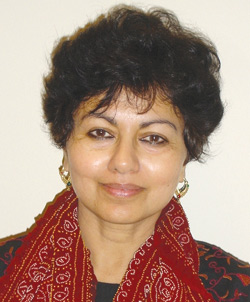 Prof. Asha Kanwar
Prof. Asha Kanwar
Vice President, Commonwealth of Learning (COL)
What is the focus of COL to expand human learning through use of technology with reference to Millennium Development Goals?
In 2000, the international community adopted eight MDGs to be achieved by 2015. These goals include the elimination of poverty, achievement of universal primary education, gender equity, better health, environmental sustainability and a global partnership for development.
Development depends on the creation, dissemination and application of knowledge by everyone. COL believes that technology can greatly facilitate these processes. For example, the techniques of open and distance learning give farmers the know-how to improve their livelihoods and rural women the knowledge to raise a healthy family. Using technology to train more teachers will help achieve the goal of Education for All. e-Learning and the knowledge media are gradually enriching the curriculum for secondary schools and universities. COL is an effective partner in combining knowledge and technology to advance development.
Political interventions and Policies of the country are the most important factors that influence the adoption of the new changes that ICT brings in area of education. Do you agree with the above statement?
Absolutely! Many countries have elaborated ICT policies but we need ICT in Education policies and clear implementation strategies, if we wish to optimise the benefits of technology. There has to be a holistic approach which will incorporate train ing for teachers and a radical change in pedagogic practice.
Who are the key existing stakeholders and potential stakeholders working in the are of ICT and education (including K-12 and Higher Education segment)?
These are too numerous to enumerate. However, speaking for the Commonwealth of Learning, we do work with governments and institutions in 46 of the 54 Commonwealth Member States at all levels of the educational spectrum–in the formal sector, our focus is on teacher education, open schooling at the secondary level and improving the quality of rdistance higher education through the use of ICTs. In the non-formal sector we support the use of technologies for skills development.
Please share the current global scenario with respect to integrating Information and Communication Technology (ICT) in the field of Education, highlighting the opportunities and challenges.
Globally, the new and emerging technology is the mobile device. In South Asia and Africa, basic mobile phones are being increasingly used for pedagogic purposes and this trend is expected to accelerate. Asia has 1 billion of the world’s 2.7 billion mobile users. Within this context does the future lie with m-learning? At one Japanese university, all students had mobile phones and on an average each student sent 200 messages per week for study purposes, as opposed to seven voice mails per week. Only 43% used PCs sending only 2 messages per week.
There is also an emergence of the community radio as a learning medium. The primary objective is to provide learning opportunities to the really unreached constituencies and we need to use ‘appropriate’ technologies rather than technology for the sake of technology.
Public Private Partnerships have been in vogue across countries around the world. What is your understanding of the same and is COL involved in any such partnerships, especially in case of Open Distance Education or Virtual University?
Distance education globally has always relied on private partnerships. For example, IGNOU offers many face to face counselling sessions, practicals and tutorial support through credible private partners. COL is a very modest organisation in terms of avialble resources and we work primarily through partnerships. Recently we supported the development of Internet Radio for the Ministry of Education, Maldives. This was done in partnership with the Open University of Malaysia, which is a private institution.
Can you share with us some of COL’s leading initiatives and initiatives that are in the pipeline?
COL has developed Learning Through Voice Interactive System (LIVES) which aims to provide communities with a learning tool based on voice mails using mobile phones. This helps us reach out to large numbers of people in their own language or dialect.
CEMCA, our office in Delhi is developing a low-cost computing device that will have major implications for teaching and learning in our schools and colleges.





















